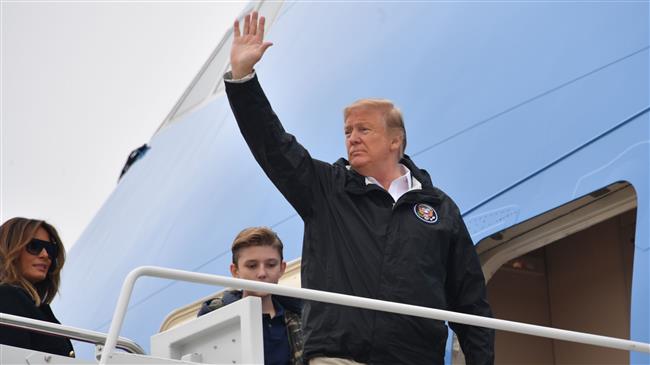Trump says he’d win if he ran in Israeli prime ministerial elections
US President Donald Trump says he would gain 98 percent of the vote if he ran for Israeli prime ministerial vote.
Speaking at a closed meeting with Republican Party donors at Trump's Mar-a-Lago residence, Trump pointed to his rare popularity among the Israelis.
He cited his controversial decision to recognize Jerusalem al-Quds as Israel's “capital” and relocate the US embassy to the city as the reasons for his support base.
Jerusalem al-Quds remains at the core of the Israeli–Palestinian conflict, with Palestinians hoping that the eastern part of the city would eventually serve as the capital of their future independent state.
The businessman-turned-president, however, seems to be taking his trade war to Israel.
According to Bloomberg, US trade negotiators will be visiting Israel this week to discuss upgrading the existing agricultural trade pacts and reducing tariffs for American farm exports to Israel.
Under the existing deal, virtually any product produced in Israel that can be competitive in the US market, can enter the US duty-free.
In contrast, US products continue to face high tariffs in many sectors limiting their access to the Israeli market, according to a 2018 report from the US Department of Agriculture’s Foreign Agricultural Service.
The US trade deficit with Israel, an economy 55 times smaller, was about $14 billion in 2017.
Ever since taking office in 2017, Trump has repeatedly vowed to reduce US trade deficits with its trade partners, calling out India, China and a number of European countries for their high tariffs.
The president has put tariffs on $250 billion of Chinese goods, as well as on most foreign steel and aluminum, solar panels and washing machines.
Trump pulled the United States out of the Trans-Pacific Partnership and renegotiated the North American Free Trade Agreement, both of which he called some of the "worst" deals.
However, the US government’s Census Bureau revealed this week that the country’s trade deficit hit a 10-year high in 2018 as it grew to $621 billion. That’s over $100 billion since he entered the White House.
Trump views the trade deficit as a measure of whether the US is winning or losing on trade.
UN chief condemns new Israeli annexation project in occupied West Bank
Araghchi briefs foreign ministers of Turkey, Egypt and S. Arabia on US talks
JD Vance’s Caucasus trip deepens concerns over sovereignty, security and US meddling
VIDEO | Press TV's news headlines
Thousands rally in Australia against Israeli president's visit as police use pepper spray
Child among four killed as Israel attacks southern Lebanon in ceasefire breach
Russia vows ‘all possible assistance’ to Cuba as US squeezes oil supplies
Hezbollah leader: Israel‑US aggression is Lebanon’s main challenge











 This makes it easy to access the Press TV website
This makes it easy to access the Press TV website